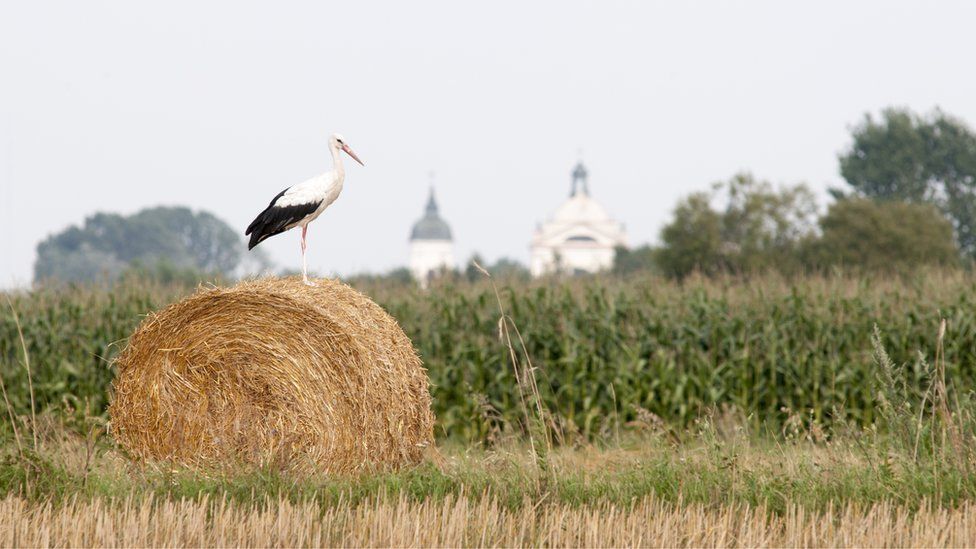What will Brexit mean for Polish 'ghost towns'?
- Published

The population of Podlaskie, an impoverished region in north-east Poland, is famous the world over.
Tens of thousands of white storks nest in its flatlands each summer, before heading south to warmer climes.
Such are the numbers, that, as one local guide quips, it can be said that one in four storks worldwide is Polish.
But in recent years, this area has gained renown for another form of migration - the exodus of its working-age population.
More than any other area in Poland, Podlaskie's residents have taken advantage of the freedom to live and work in other EU countries - particularly the UK.
In some towns, more than one in 10 has left, mostly young people - leaving none but the elderly behind.
"There used to be two cinemas, but they both closed," says Kasia, one of the remaining residents of Monki, a virtual ghost town with the distinction of having seen the highest number of its citizens depart to richer EU economies.
"And there are just two concerts a year," she adds.
"Everyone is going, everyone is leaving," one of the owners of a faded electrical store in the centre of town, unchanged for decades, laments.
"Only the disabled people stay - all the villages are empty."
'Tragedy of small towns'
Such is the suspicion of foreign influence, that the woman, who is in her 60s, won't give her name to the BBC. But on the topic of migration, she is loquacious.
"The tragedy of small towns is that old people can't follow the trend of globalisation and make the most of new technology. And the young people decide to leave to get by in the big towns and work for big corporations."
Despite it being a regular weekday, few customers are to be seen - the only life visible in the town centre are a scattering of older women, sitting on stoops and smoking idly.
The electrical store shopkeeper blames this scene on Poland's accession to the EU in 2004.
"Things have changed a lot - it's like a desert. You drive through these villages and there's nobody here. They go abroad and make money and they leave these places empty."
'Miracle economy'
Despite such local hardships, there is little argument that Poland has been a net beneficiary of its membership of the European Union.
It helped transform the country from a post-Soviet society to a robust, modern economy, so resilient that it became the only EU state not to plunge into recession following the 2008 financial crisis.
This, coupled with the fact that its economic value, or gross domestic product, doubled in just over two decades, had led to Poland being dubbed the "miracle economy".
With close to a million Poles living and working in the UK, and sending back more than a billion euros each year, many in the country were hoping that Britain would vote to remain a member of the EU.
But now that the divorce is under way, some see an opportunity.
"At the moment Poland has a demographic problem," says Dr Przemyslaw Biskup, a European integration expert at the University of Warsaw.
"It is not that bad that we would have our compatriots returning - our labour market is becoming more and more hungry for employees. Such people would bring new experience, new skills and new qualifications back to Poland."
Are returnees a reality?
Indeed, a recent report by the IMF concluded that large-scale emigration may have slowed growth in Central and Eastern European countries.
Not that Brexit necessarily means Poles will be returning in their droves.
Many of those who settled in the UK are now permanent residents, or on the path to citizenship.
More and more, they tend to bring their families to Britain, rather than return to Central Europe.
But there is some evidence of "returnees" - even in an area with as few economic opportunities as Podlaskie.
On the main square of the remote historic town of Tykocin, local boy Kamil Swietorzecki runs a cafe and gallery, catering to the many tourists who visit the nearby 17th Century synagogue or 600-year-old castle.
"I went to Liverpool when I was 21 and worked in kitchens and various places," he says, pausing while brewing some strong Polish coffee.
"The aim was to make money and open a company back here."
Open borders
Stories like Kamil's are still an anomaly, however. Freedom of movement is vital to many Poles, particularly those who survive on the remittances sent back home from those working in Britain.
Which is why Jakub Wojnarowski, deputy director general of the Polish business organisation Lewiatan, thinks Poland will insist on open borders in any trade negotiations with the newly independent UK.
"There will be no concession," he says.
The Polish government, Mr Wojnarowski predicts, "will not be trading freedom of movement for access to the common market" even if it ends up hurting some of the 4,000 companies Lewiatan represents.
The powers that be will have to listen to the "voice of the ordinary people," whose wives, sons and daughters are working in the UK, he believes.
"They will say, 'We want to keep this alive.'"
Back in Tykocin, cafe owner and returnee Kamil, who still has family in the UK, hopes that Brexit will not lead to a raising of the drawbridge between the two countries.
But if it does, he is not too concerned for his compatriots.
"It is mostly a tragedy for those who are already there," he says, but adds that for those Poles looking for work elsewhere there is always the rest of the EU.
- Published30 December 2020
- Published25 June 2016